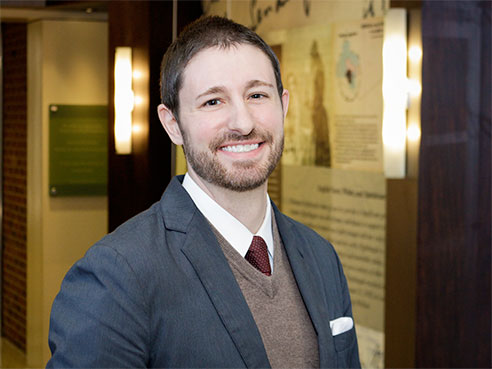 UAB School of Nursing postdoctoral fellow J. Nicholas Dionne-Odom, Ph.D., has received a five-year, $935,000 K99/R00 Pathway to Independence Award from the National Institute of Nursing Research to develop a palliative care health-coaching program for family caregivers of persons with advanced cancer.
UAB School of Nursing postdoctoral fellow J. Nicholas Dionne-Odom, Ph.D., has received a five-year, $935,000 K99/R00 Pathway to Independence Award from the National Institute of Nursing Research to develop a palliative care health-coaching program for family caregivers of persons with advanced cancer.
The award, given by NINR under the umbrella of the National Institutes of Health, supports postdoctoral fellows in research and is designed to provide a career pathway for them to move from a mentored postdoctoral position to an independent tenure-track faculty position.
Dionne-Odom will receive support in two phases: a two-year K99 phase in which he will focus mostly on research training and collecting pilot data, and a three-year R00 phase in which he will focus mostly on completing his research.
During the K99 phase, Dionne-Odom will conduct interviews with patients, caregivers and those who help them navigate the health care system to develop a health-coaching intervention that will be delivered by phone, tablet or other telecommunication device. During the three-year R00 phase, he will lead a small, randomized controlled trial involving 60 family caregivers over a 24-week period to assess the acceptability, feasibility and potential benefits of the new program.
“As an ICU nurse for more than 10 years, I witnessed the very end of life for hundreds of individuals with cancer and other illnesses,” Dionne-Odom said. “Family members of these patients often undergo unimaginable distress because they aren’t prepared for their loved one’s death, and for the decisions they have to make.
| “The goal of the research I do and what drives my passion is to try to reduce the risk of family caregivers having undue distress over the course of their loved one’s advanced illness, and to avoid traumatic experiences at the very end of life.” |
“The goal of the research I do and what drives my passion is to try to reduce the risk of family caregivers having undue distress over the course of their loved one’s advanced illness, and to avoid traumatic experiences at the very end of life.”
Part of achieving this goal includes finding ways to encourage caregivers to maintain their own physical health and well-being.
Dionne-Odom cites estimates that by 2020 the number of individuals with cancer in the United States is expected to swell by 31 percent, from 13 million to 18 million. Of those, the number in their last year of life is expected to increase from 901,000 to 1.22 million, most with a family member who provides necessary care. He also cites estimates that family caregivers provide 80 percent of the care for patients in the advanced stages of cancer at an estimated value of $642 billion annually, making it unfeasible to replace their services with paid health care professionals.
This makes it imperative to develop interventions that help family caregivers stay healthy and functioning at a high level, for their sakes as well as their loved ones with cancer, Dionne-Odom says.
“The burden placed on family caregivers and the toll on their mental and physical health have never been greater and will continue to rise,” Dionne-Odom said. “The health-coaching aspect of my research will focus on using a caregiver’s beliefs, values and life story to motivate them to set and achieve goals for their own health and for the many tasks they’re faced with when caring for someone with serious illness.”
To successfully implement this type of coaching, Dionne-Odom believes it is important to reach the family caregiver early in the person’s advanced illness. It is during this time that they and the person they care for are still relatively healthy, high-functioning, and able to learn new skills, coping strategies and self-care habits.